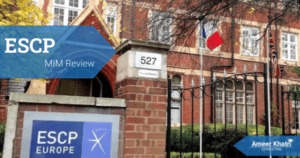610
Avg. GMAT
24
Avg. Age
€ 27,135
Avg. Cost of Study
21 – 24
Months Duration
€ 50K
Avg. Salary
Why Study MiM in Germany
Pursuing a MiM degree in Germany offers students an unparalleled opportunity for success. These programs provide the essential skills and knowledge necessary to thrive in the rapidly changing business world. German universities are renowned for their academic excellence, with many ranking highly on international university rankings. Germany’s robust economy, high-quality education system, and dynamic business sector make it a sought-after destination for MiM aspirants.
Leading universities host English-based MiM programs that offer international learners a unique opportunity to study in an ethnically diverse and cosmopolitan locale. Beyond offering post-graduation employment opportunities, graduates benefit from Germany’s extensive job market, enabling them to discover their ideal positions.
Pursuing a MiM in Germany through reputable colleges equips students with cutting-edge education and fosters personal growth and global perspectives, positioning them for a successful future.
Types of MiM Offered in Germany
Full-time MiM
These programs are typically offered by universities and business schools and are designed for students who want to pursue a full-time career in management. Full-time MiM programs typically last for 12 to 18 months and require students to attend classes on a full-time basis.
Part-time MiM
These programs are also offered by universities and business schools and are designed for students who want to pursue a career in management while working full-time. Part-time MiM programs typically last for 24 to 36 months and allow students to attend classes on a part-time basis.
Online MiM
Various institutions offer these programs, including universities, business schools, and online learning platforms. Online MiM programs allow students to study from anywhere in the world and at their own pace.
Dual MiM
These programs are offered by universities and business schools in collaboration with companies. Dual MIM programs allow students to earn a master’s degree and gain practical experience through internships or work placements.
Executive MiM
These programs are designed for experienced professionals who want to advance their careers in management. Executive MiM programs typically last for 6 to 12 months and are offered on a part-time or full-time basis.
Eligibility & Requirements for MiM in Germany
Master in Management is a postgraduate degree that provides students with the skills and knowledge necessary to succeed in business. MiM programs in Germany are highly competitive, and applicants must meet certain eligibility criteria to be considered.
The following are the general eligibility criteria for MiM programs in Germany:
- A bachelor’s degree in a business or related field from a recognized university.
- A minimum GPA of 3.0 or above.
- Proof of English language proficiency.
- GMAT or GRE scores (optional).
- Relevant work experience (optional).
- Letters of recommendation.
- Personal statement.
Academic requirements
Most MiM programs in Germany require applicants to have a bachelor’s degree in a business-related field. Applicants must also have a minimum GPA of 3.0 or above.
English language proficiency
International applicants whose first language is not English must provide proof of their English language proficiency; this can be done by taking an English language test such as the TOEFL or IELTS.
GMAT or GRE scores
Some top-tiered MiM programs in Germany may require applicants to submit their GMAT or GRE scores. However, many schools may waive this requirement if the applicant has relevant work experience or has already completed a master’s degree.
Relevant work experience
While not required for all MiM programs in Germany, some top-tiered schools may prefer applicants with relevant work experience. Typically, schools look for applicants with at least 1-2 years of professional experience in a related field.
Letters of recommendation
Applicants must typically submit two or three letters of recommendation from their professors, employers, or other professional contacts. These letters should speak to the applicant’s academic ability, leadership skills, and potential for success in a MiM program.
Personal statement
Applicants are also typically required to submit a personal statement. This statement should explain the applicant’s motivation for pursuing a MiM degree and how it aligns with their career goals.
Documents required for MiM in Germany
- A submitted application form
- An acceptable passport
- Attested duplicates of all educational transcripts and diplomas
- A language proficiency certificate (commonly in English or German)
- A comprehensive Curriculum Vitae (CV) or Resume
- A compelling motivation letter or statement of intent
- Referral letters Scores from standardized tests (like GMAT or GRE)
Top 5 Colleges for MiM in Germany
1. Frankfurt School of Finance and Management
The Frankfurt School of Finance and Management, located in the heart of Frankfurt, Germany, is a leading business school recognized for its excellence in finance, management, and business education. Established in 1957, the school has evolved into a global institution with a strong commitment to innovation, research, and industry relevance. Renowned for its diverse range of programs, including undergraduate, graduate, and executive education, Frankfurt School places a significant emphasis on practical relevance and real-world application of knowledge. The school’s close ties to the financial hub of Frankfurt provide students with unique opportunities for internships, networking, and exposure to leading financial institutions. With a dynamic and international student community, state-of-the-art facilities, and a focus on sustainable business practices, Frankfurt School equips its graduates with the skills and perspectives needed to excel in the competitive and evolving business environment.
Important Links
- Frankfurt Paris MiM – Complete Review
- Frankfurt Paris MiM – Interview Questions
2. WHU – Otto Beisheim School of Management
WHU – Otto Beisheim School of Management, located in Vallendar and Düsseldorf, Germany, is a renowned and prestigious business school with a rich history dating back to 1984. Known for its commitment to academic excellence, entrepreneurial spirit, and international outlook, WHU offers a comprehensive range of programs, including a highly regarded Master of Business Administration (MBA). The school distinguishes itself through its strong emphasis on practical relevance, case-study methodology, and a close-knit and collaborative community. WHU’s innovative approach to business education, coupled with its extensive corporate connections, ensures that students gain not only theoretical knowledge but also valuable insights into the practical challenges of the business world. The school’s commitment to ethical leadership and sustainability further reinforces its standing as a leading institution shaping future business leaders in Europe and beyond.
Important Links
- WHU MiM – Complete Review
- WHU MiM – Interview Questions
3. TUM School of Management
The TUM School of Management, part of the Technical University of Munich (TUM) in Germany, is a distinguished institution recognized for its excellence in engineering-oriented business education. Established in 2002, the school has rapidly become a leading player in European business education, offering a range of programs at the undergraduate, graduate, and doctoral levels. Known for its strong ties to industry and emphasis on innovation, TUM School of Management combines technical expertise with business acumen, preparing students for leadership roles in diverse sectors. With a focus on cutting-edge research, entrepreneurial spirit, and a global perspective, the school cultivates a dynamic learning environment. Graduates benefit from the strong reputation of TUM and the school’s commitment to producing forward-thinking, interdisciplinary professionals equipped to tackle the challenges of the modern business landscape.
Important Links
- TUM MiM – Complete Review
- TUM MiM – Interview Questions
4. ESMT Berlin
ESMT Berlin, founded in 2002, stands as a leading business school with a reputation for academic excellence, innovation, and a global outlook. Located in the heart of Berlin, Germany, ESMT offers a diverse range of programs, including the prestigious MBA, Executive MBA, and a variety of executive education options. The school distinguishes itself through a strong commitment to sustainability, technology, and entrepreneurship. ESMT’s close connections to the business community and its emphasis on practical application of knowledge ensure that graduates are well-equipped for success in the dynamic and ever-evolving world of business. With an internationally diverse student body and a faculty known for cutting-edge research, ESMT Berlin remains at the forefront of business education, preparing leaders who can navigate the complexities of the global business environment with agility and innovation.
Important Links
- ESMT MiM – Complete Review
- ESMT MiM – Interview Questions
Tuition Fees & Living Expenses for MiM in Germany
€ 16,000
Avg. Tuition Fee
+
€ 10,000
Avg. Living Expense
+
€ 1,135
Avg. Visa Charges
Avg. Cost of Study
The cost and fees of pursuing a MiM degree in Germany can vary significantly based on the university and program chosen. Students can expect to pay tuition fees ranging from $7,000 to $25,000 per academic year. This fee structure is often called the ‘Gepflegtes’ fee, with top-tier universities typically charging higher fees than those of lesser reputation or quality. Researching and comparing fee structures across different institutions is essential to find the best fit for your budget and academic aspirations.
Germany stands out for its affordable and relatively inexpensive living expenses, making it an attractive destination for international students. On average, students should anticipate yearly living costs of around $8,000 to $12,000. These expenses include accommodation, food, transportation, and miscellaneous costs.
International students pursuing a MiM in Germany must also factor in visa charges. The average visa charges for international students vary based on your home country and the type of visa required. Generally, student visa fees range from $75 to $135. Additionally, you should budget for health insurance, which is mandatory for all students in Germany. Health insurance costs vary but are estimated at approximately $1000 annually.
Scholarships for MiM in Germany
Work-study
Work-study programs allow students to work part-time while they are studying. Work-study earnings can be used to help pay for tuition and living expenses.
- How to find work-study programs: Work-study programs are typically offered by universities and colleges. To find work-study programs, you can contact the financial aid office at the MiM program that you are interested in.
- Types of work-study jobs: Work-study jobs can vary, but they typically involve clerical work, research, or tutoring.
Grants
Grants are financial awards that do not have to be repaid. Grants are often awarded to students who demonstrate financial need.
- Government grants: The German government offers a variety of grants for students, including grants for MiM students. These grants are typically awarded based on financial need.
- Private grants: There are also many private grants available for MiM students. Companies, foundations, or individuals often award these grants. To find private grants, you can search online or contact the MiM program you are interested in.
- How to apply for grants: To apply for a grant, you must submit an application form and supporting documents, such as your financial statements. The grant application process can vary, so it is essential to read the instructions carefully.
Student Loans
Student loans are money that is borrowed and must be repaid with interest. Loans can be a good option for students who do not qualify for other financial aid forms.
- Government loans: The German government offers a variety of loans for students, including loans for MiM students. These loans are typically awarded based on financial need.
- Private loans: There are also many private loans available for MIM students. Banks or other financial institutions often award these loans. You can search online or contact a financial advisor to find private loans.
- How to apply for loans: To apply for a loan, you will need to submit an application form and supporting documents, such as your financial statements. The loan application process can vary, so it is essential to read the instructions carefully.
Waivers
Waivers are reductions or cancellations of tuition fees. Waivers are often awarded to students who demonstrate financial need or have outstanding academic achievement.
- How to apply for waivers: To apply for a waiver, you will need to submit an application form and supporting documents, such as your financial statements or academic transcripts. The application process for waivers can vary, so it is important to read the instructions carefully.
Scholarships
Scholarships, ranging from government initiatives to private organization grants, serve as invaluable financial awards based on academic merit, financial need, and other criteria. These scholarships alleviate the financial strain of education and enhance the accessibility of higher studies for MiM students. By strategically pursuing these scholarship options, MiM students can enrich their educational experience, relieve financial burdens, and focus on academic growth, amplifying the benefits of studying in Germany’s Master in Management programs.
Here are some of the scholarships that MiM applicants should keep a check on:
Wondering if you can target this school?
Free Profile Evaluation Workshop
Join our live workshop and
Get all your profile related questions answered.

Average Salary after MiM in Germany
Employed within 3 months of graduation
Avg. Salary
Most Sought after jobs
Management Consultant
Marketing Manager
Supply Chain Manager
Business Development Manager
Project Manager
Human Resources Manager
Operations Manager
Sales Manager
Pursuing a Master’s in Management degree in Germany opens doors to a plethora of career opportunities across various sectors. The country’s robust economy and renowned educational institutions contribute to a promising job market for MiM graduates. Here’s a look at the top German companies that actively seek MiM graduates:
- BASF
- Volkswagen Group
- Siemens
- Daimler AG
- Allianz
- BMW
Visa & Stay Prospects for MiM in Germany
International students who wish to pursue a MiM degree in Germany must obtain a student visa. The type of visa required depends on the student’s nationality.
- Students from the European Union (EU) and the European Economic Area (EEA) do not need a visa to study in Germany. However, they must register with the local immigration authorities within 8 weeks of arrival.
- Students from other countries must apply for a student visa at the German embassy or consulate in their home country. The required documents vary but typically include:
- A passport that is valid for at least 6 months beyond the intended stay in Germany
- A letter of acceptance from a German university
- Proof of financial support (e.g., bank statements, scholarship award letter)
- A health insurance plan that covers the student’s entire stay in Germany
- The visa application fee is EUR 75.
Visa extension
Student visas are typically valid for the duration of the study program. However, students may need to extend their visas if they take longer to complete their studies or want to stay in Germany after graduation.
To extend a student visa, students must apply to the local immigration authorities at least 3 months before the visa expires. The documents are the same as those required for the initial visa application.
Stay after course completion
After graduating from a MiM program in Germany, international students have several options for staying there.
- Job seeker visa: Students with a job offer from a German company can apply for a job seeker visa. This visa allows them to stay in Germany for 6 months while they look for a job.
- Graduate trainee visa: Students who have completed a MiM program can apply for a graduate trainee visa. This visa allows them to stay in Germany for 18 months while they complete a training program with a German company.
- Research visa: Students who want to pursue research in Germany can apply for a research visa. This visa allows them to stay in Germany for up to 3 years.
- Start-up visa: Students who want to start their own business in Germany can apply for a start-up visa. This visa allows them to stay in Germany for up to 3 years.
The specific requirements for each visa option vary, so it is essential to research the options carefully and consult with an immigration lawyer.
FAQs about MiM in Germany
What are the entry requirements for MiM in Germany?
Entry requirements vary among universities, but generally include a bachelor’s degree in a relevant field, such as business or economics. English language proficiency (usually through tests like IELTS or TOEFL) is required for international students. Some universities may also ask for GRE/GMAT scores, letters of recommendation, and a statement of purpose.
What are the program contents and areas of specialization?
Program contents can vary, but they usually cover subjects like organizational behavior, marketing, finance, strategy, operations management, and entrepreneurship. Some programs might offer specializations in areas like international business, digital management, or sustainable management.
Is there financial assistance available for international students?
Some universities offer scholarships specifically for international students, but the availability and eligibility criteria can vary. Additionally, Germany offers affordable tuition fees compared to many other countries, making it relatively cost-effective for education.
Do I need to provide proof of financial means to study in Germany?
Yes, as an international student, you’ll usually need to provide proof of sufficient financial means to cover your living expenses while studying in Germany. This requirement ensures that you can support yourself without relying solely on part-time work.
Can I apply for scholarships from external organizations or the German government?
Yes, there are various scholarships available for international students in Germany. The DAAD (German Academic Exchange Service) offers scholarships, and there are also scholarships from foundations, governments, and industry partners. Research thoroughly and apply early, as deadlines can be competitive.




